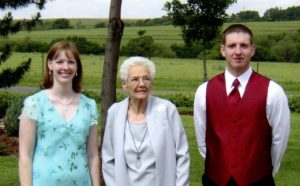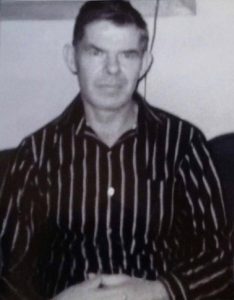



Pictured from left to right: Uncle Venoy (photo courtesy of Sarah Foust); Grandpa Cecil and Grandma Rena (my mom’s parents); Staci, Grandma Velma (my dad’s mom), and Stoney; and Grandpa Fred (my dad’s dad)
“Jesus replied: ‘Love the Lord your God with all your heart and with all your soul and with all your mind.’” (Mt. 22:37)
Heart problems run in my family. Of my four biological grandparents, all had heart problems. Of my mom’s five brothers, two have now passed away from heart attacks. Two years ago this March, my uncle Venoy suffered a massive heart attack, passing away just hours later. Were there signs? Yes. He had terrible back pain for three days prior to the heart attack, and even though he rarely suffered from that particular malady, none of us recognized it as a sign of an impending heart attack.
I know that the signs of a heart attack vary from person to person and are not always obvious, but it still came as a shock that my uncle didn’t have more symptoms. It was particularly eye-opening when my mom remarked that her own mom’s heart attack had started with intense stomach pain—again, not a symptom that I normally associate with a heart attack. My grandma survived that heart attack in the early 1990s and had quadruple bypass surgery to repair the damage. When she recovered, she completely changed her diet and lifestyle, which I’m confident extended her life by many years.
I could give you a long list of the heart problems that run in my family, but I won’t bore you with those details. But one note of interest, at least to me: I have an irregular heartbeat that I rarely think about because it doesn’t bother me, but I’ve been known to freak out more than one doctor when he had trouble finding my heartbeat.
The heart is not only the center of our organs, the muscle that contracts and expands to allow blood to flow to the rest of our body, but it is also the center of our emotions. When we speak of love, we talk about how we’ve given our heart away. When we suffer great loss, we say our heart has been broken.
The Bible has plenty to say about the heart:
- “Above all else, guard your heart, for everything you do flows from it.” (Prov 4:23)
- “For where your treasure is, there your heart will be also.” (Mt 6:21)
- “You brood of vipers, how can you who are evil say anything good? For the mouth speaks what the heart is full of.” (Mt 12:34)
- “A person may think their own ways are right, but the Lord weighs the heart.” (Prov 12:2)
- “A good man brings good things out of the good stored up in his heart, and an evil man brings evil things out of the evil stored up in his heart. For the mouth speaks what the heart is full of.” (Lk 6:45)
This is just a sampling of the verses that refer to the heart as the center of our being, where we house our true motives and feelings. And no matter how we may try to hide them, God always knows what our true motives and feelings are.
We also know from Scripture that God renews our heart and our mind when we turn to him and confess our true selves to him: “Create in me a pure heart, O God, and renew a steadfast spirit within me” (Prov 51:10). When we place our trust in him, he will show us the way and not let us down: “Trust in the Lord with all your heart and lean not on your own understanding” (Prov 3:5). By trusting in his Word and his faithfulness, we know that he will strengthen our hearts, our emotional center: “My flesh and my heart may fail, but God is the strength of my heart and my portion forever” (Ps 73:26). With his help, we can face both physical and emotional trials in the days ahead.
Dear Jesus, I pray that you will be my portion and keep my heart steadfast in you. Sustain me as I deal with physical deterioration and emotional strife. Strengthen my trust in you. Amen.